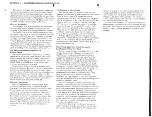
25
the LPF and a 6db/oct in the HPF. This means that in the HPF the
frequencies are reduced more gradually. The
Stop Band
is the zone where
all the frequencies have been removed.
Using waves rich in harmonics is the best way to use the filters as we will
remove harmonics and shape the waveforms. Let’s see it. Set the next
patch:
Connect the mixer to the
VCA2
OUT
as usual. Note that
XTOSC·Y
is
prepatched the
VCF
IN1
so you should be listening an unfiltered square
wave. Turn the
FREQ
pot CCW and listen how the harmonics are removed.
Now press the
TYPE
button and switch it to HPF. Turn the
FREQ
pot CW and
listen.
Now turn the
Q
pot fully CW. Move the FREQ pot and hear how it affects the
sound. This
Q
is the
RESONANCE
. Turn the
IN1
pot at different positions and
hear how the resonance has a different behaviour. Experiment with
different values and waves. Repeat the process connecting the
NOISE
output to the
IN1
. Noise has all the frequencies sounding randomly, and it is
a good reference to listen a
VCF
.
Resonance occurs when sound in the pass
band near the cut-off frequency is sent
back into the filter as it comes out,
creating feedback. The amount of
feedback affects the volume of these
Summary of Contents for ANTS!
Page 1: ...ANTS PLANKTON ELECTRONICS ...
Page 2: ......







































